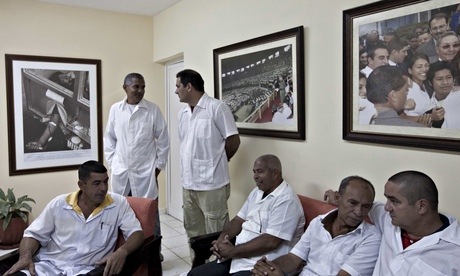
Cuba’s large-scale deployment of medical staff to fight the west African Ebola outbreak continued on Wednesday as planes carrying 91 doctors and nurses from the Caribbean island arrived in Liberia and Guinea.
Havana has pledged more health professionals to combat the disease than any other government, with 461 Cuban doctors and nurses receiving specialist training for a six-month mission to the affected countries. Cuba has already deployed 165 medical workers to Sierra Leone, bringing its total presence in the three countries to 256.
Speaking before they flew to Liberia, two Cuban doctors told Reuters that competition to join the west African mission – which attracted 15,000 volunteers – had been fierce. “There have been fights breaking out, heated arguments, with some doctors asking, ‘How come my colleague gets to go and I can’t?’,” said Dr Adrian Benítez.
His colleague Leonardo Fernández said the volunteers had felt compelled to help. “We know that we are fighting against something that we don’t totally understand. We know what can happen. We know we’re going to a hostile environment,” he said. “But it is our duty. That’s how we’ve been educated.”
Cuba’s rapid and generous response to the epidemic, which has killed more than 4,500 people in west Africa, has been recognised by both humanitarian agencies and its traditional foes in Washington.
“The international response has been slow … The virus is spreading faster than we’re all setting up,” Sean Casey, director of the International Medical Corps’s emergency response team in Liberia told AFP. “It’s good that the Cubans are coming. We need more countries to step up.”
Last week the US secretary of state, John Kerry, broke with decades of US criticism of the communist state when he praised Cuba for its “impressive” efforts to tackle Ebola. “Cuba, a country of just 11 million people, has sent 165 health professionals and it plans to send nearly 300 more,” he told foreign diplomats in Washington.
On Tuesday, US officials went further, saying they were happy to be cooperating with Havana. “We welcome the opportunity to collaborate with Cuba to confront the Ebola outbreak. Cuba is making significant contributions by sending hundreds of health workers to Africa,” a state department source told AFP. “In that spirit, the US department of state is communicating with all members of the international community, including Cuba, involved in this global effort through multilateral channels such as the World Health Organisation as well as diplomatic briefings.”
Additional evidence of a thawing of the cold war enmity came last weekend when an article by Fidel Castro appeared in state media announcing that Cuba would “gladly cooperate with American personnel” on Ebola. The sentiment was echoed a few days later by his brother, Raúl, who succeeded him as Cuba’s president eight years ago.
The island has long used medical diplomacy and its “ejército de batas blancas” (army of white coats) to fight US efforts to label it a pariah on the international stage.
The country prizes its universal healthcare system and, since 1960, has sent 135,000 health workers overseas for emergency response or to work in under-served communities. Cuba has 50,000 doctors and nurses working in 66 countries across Latin America, Africa and Asia, according to the health ministry.
The doctors have also become a key source of billions of dollars a year in revenue since 2004, when Havana began charging host governments for their services.
The Cuban deployment has underlined the vast disparities in the humanitarian response from different countries. On Wednesday, US officials called on some European countries to contribute more money and medical personnel to the fight.
Ambassador Donald Lu, the state department’s deputy coordinator for Ebola response, said that although 35 countries had so far pledged $690m to combat the disease, the UN still needed at least another $623m.
“More than half of these 35 countries are from Europe; Europe has a long tradition of leadership in humanitarian crises and we are very grateful for the leadership shown by the European people in this global response effort,” he said. “In our consultations, we have heard that European countries are poised to make some major new pledges in the coming days. But while we recognise European leadership, we also want to emphasise that the current pledges are not enough to defeat the epidemic.”
The UK has so far committed £125m and 750 military personnel to fighting Ebola in Sierra Leone, a former British colony. Last week, Justine Greening, the UK international development secretary, called on world leaders to “wake up” to the crisis. David Cameron voiced similar concerns, saying: “We are doing a huge amount and I think it’s time for other countries to look at their responsibilities and their resources and act in a similar way to what Britain is doing in Sierra Leone, America’s doing in Liberia, France is doing in Guinea.”
Cameron’s intervention was designed to step up pressure on other EU leaders to agree to increase their contributions to fighting Ebola at a summit in Brussels this week. It is felt that Germany could make a greater contribution of cash and medical resources, while France has further to go in Guinea to match Britain’s efforts in Sierra Leone.














